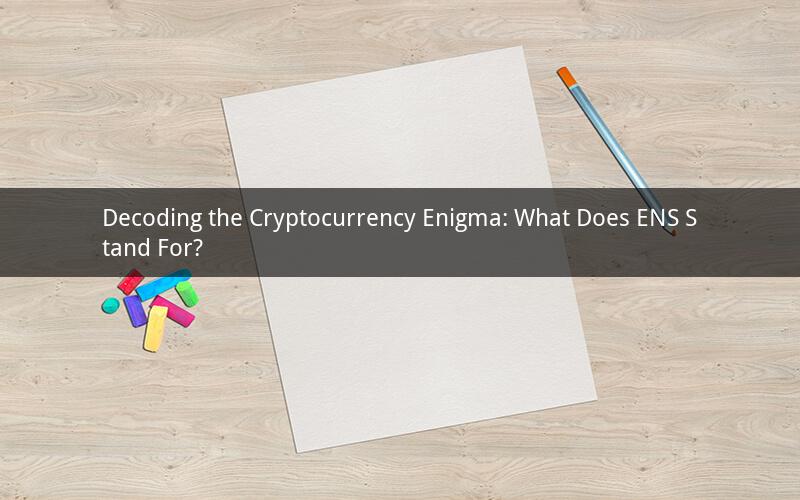
In the rapidly evolving world of cryptocurrencies, new terminologies and abbreviations emerge almost daily. One such term that has gained significant traction is ENS, which stands for Ethereum Name Service. This article delves into the meaning of ENS, its significance in the crypto space, and how it has revolutionized the way we interact with blockchain technology.
What is ENS?
ENS is a decentralized naming system that allows users to register and manage domain names on the Ethereum blockchain. It was introduced to address the limitations of using lengthy hexadecimal addresses for Ethereum transactions. By using human-readable domain names, ENS simplifies the process of interacting with smart contracts and decentralized applications (DApps) on the Ethereum network.
The ENS system operates on a hierarchical structure, where users can register domain names like "myname.eth" or "mybusiness.eth." These domain names can then be associated with Ethereum addresses, allowing users to receive ETH, send transactions, or interact with smart contracts using simple, memorable names.
How Does ENS Work?
The ENS system is built on top of the Ethereum blockchain and operates through a series of smart contracts. These contracts manage the registration, renewal, and resolution of domain names. Here's a brief overview of how ENS functions:
1. Registration: Users can register domain names through ENS registrars, who act as intermediaries between users and the Ethereum blockchain. The registration process involves paying a fee in ETH, which is used to fund the ENS smart contracts.
2. Renewal: Once a domain name is registered, users must renew it periodically to maintain ownership. The renewal process is similar to registration, with users paying a fee to extend their domain name's validity.
3. Resolution: When a user enters a domain name in a web browser or wallet, the ENS system resolves the domain name to its corresponding Ethereum address. This resolution process is facilitated by the ENS resolver smart contract, which stores the mapping between domain names and addresses.
4. Updates: Users can update their ENS records at any time, including changing the associated Ethereum address, setting up DNS records, or configuring other ENS features.
Benefits of ENS
The ENS system offers several benefits to users and developers in the crypto space:
1. User-Friendly: ENS simplifies the process of interacting with Ethereum by replacing complex hexadecimal addresses with easy-to-remember domain names.
2. Security: By using domain names, users can reduce the risk of typos and phishing attacks, as they are less likely to mistype a domain name compared to an Ethereum address.
3. Accessibility: ENS makes it easier for non-technical users to access and use Ethereum-based services, fostering wider adoption of the blockchain technology.
4. Flexibility: ENS allows users to associate multiple addresses, records, and configurations with a single domain name, providing greater flexibility in managing their digital assets.
5. Integration: ENS can be integrated with various DApps and services, enabling seamless interactions between users and blockchain applications.
Challenges and Future Outlook
Despite its numerous benefits, the ENS system faces certain challenges:
1. Scalability: As the Ethereum network continues to grow, the scalability of the ENS system may become a concern, especially during peak usage periods.
2. Competition: Other naming systems, such as .crypto and .eth, are emerging in the crypto space, which could potentially dilute the market share of ENS.
3. Security Risks: Although ENS enhances security by reducing the risk of typos and phishing attacks, it is not immune to vulnerabilities. Users must remain vigilant and follow best practices to protect their digital assets.
Looking ahead, the ENS system is expected to play a crucial role in the growth of the crypto space. As more users and developers adopt the technology, the demand for ENS domain names is likely to increase. Additionally, ongoing improvements in the ENS system, such as enhanced security features and improved scalability, will further solidify its position as a key player in the crypto ecosystem.
Frequently Asked Questions
1. What is the difference between ENS and a traditional domain name?
ANS: ENS is a decentralized naming system built on the Ethereum blockchain, while traditional domain names are managed by centralized entities like ICANN. ENS domain names are associated with Ethereum addresses, while traditional domain names are used for hosting websites and other online services.
2. Can I transfer my ENS domain name to another user?
ANS: Yes, you can transfer your ENS domain name to another user by updating the owner record in the ENS resolver smart contract. The transfer process requires you to pay a small fee in ETH.
3. Are ENS domain names permanent?
ANS: ENS domain names are not permanent, and users must renew them periodically to maintain ownership. The renewal process is similar to registration, with users paying a fee to extend the validity of their domain name.
4. Can I use my ENS domain name for non-Ethereum purposes?
ANS: ENS domain names are primarily designed for use with Ethereum-based services. However, certain third-party services may allow you to use your ENS domain name for non-Ethereum purposes, such as email or social media handles.
5. How much does it cost to register an ENS domain name?
ANS: The cost of registering an ENS domain name varies depending on the registrar and the specific domain name. Generally, users can expect to pay a fee in ETH, which is used to fund the ENS smart contracts.